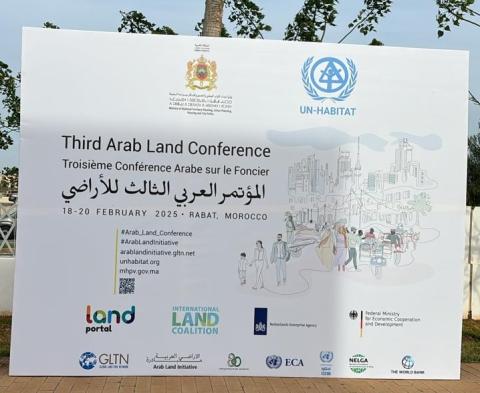Discover hidden stories and unheard voices on land governance issues from around the world. This is where the Land Portal community shares activities, experiences, challenges and successes.
 Follow our
Follow our
Sustainable Development Goals
Blog Series!
Interested in land corruption?
Follow our Land & Corruption Blog Series
for in-depth perspectives from the experts.
Issues
Geographical focus
The Third Arab Land Conference, held in Rabat, Morocco from 18-20 February 2025 opened an avenue of possibilities for improving policies and practices to govern land in the Arab world. From the launch of several groundbreaking initiatives to empowering women and youth, and fostering data transparency and academic excellence, the event showcased commitments and collaborative work shaping the future of land governance in the region.
Ethiopia's land administration sector has undergone significant improvements over the last decade. With approximately 50 million parcels of land, around 30 million have been demarcated and registered, and 25 million parcels have received Second Level Landholding Certificates (SLLC) digitized in the National Rural Land Administration Information System (NRLAIS). Despite these advancements, most rural landholders continue to rely on informal land transactions after initial registration, primarily due to the distance between kebeles (sub-district) and woreda (district) land offices.
On January 23, 2025, the Land Portal Foundation and Mekong Region Land Governance (MRLG) convened a webinar to explore the evolving landscape of agricultural investments in the Mekong region. Experts from various sectors joined to discuss the impact of industrial crops, smallholder farmer integration into transnational value chains, and the resulting economic, environmental, and social transformations.
Banner Image Credits: Photo by Ashwini Chaudhary(Monty) on Unsplash | Free to use under the Unsplash License
The webinar Inclusive Land Governance and Fit-for-Purpose Land Administration: Whose Purpose?, which took place on 19 September, 2024, explored how a people-centered and holistic approach can transform Fit-for-Purpose Land Administration (FFPLA) and ensure that land administration truly serves the needs of communities. The webinar, which was moderated by Imke Greven of the LAND-at-Scale Program Advisor at the Netherlands Enterprise Agency (RVO) gathered over 275 people.
A Strategic Pivot for the Sustainable Development Goals (SDGs) Promise
Inclusive land governance is critical to securing land rights and achieving the Sustainable Development Goals (SDGs). Secured land rights are foundational for sustainable development, with the access, control and use of land presenting significant responsibilities for governments and their legal systems. Equitable land governance ensures fair access to land, which drives economic growth, reduces poverty, and promotes environmental sustainability.
In her keynote speech during the opening plenary session of the the IOS Fair Transitions - LANDac Conference & Summit: Land governance and the politics of fair transitions: Deepening the search for social justice on 3 July, 2024, Morgan Ody, General Coordinator of La Via Campesina and a small-scale vegetable farmer in Brittany, France, describes how power has always been disputed for the last five centuries, and how peasants and indigenous peoples all over the world challenge the powerful.
The Netherlands Enterprise Agency (RVO) is delighted to announce that LAND-at-scale has recently started in Egypt, being integrated into the broader Agricultural Innovation Project (AIP phase II) implemented by GIZ Egypt, co-financed by Federal Ministry for Economic Cooperation and Development (BMZ) and
Photo: Farmers at the CuveWaters Green Village in Epyeshona, Northern Namibia, photo by ISOE Wikom, sourced from flickr, CC BY-NC-SA 2.0 DEED license
As part of a scoping study titled Land Governance for Climate Resilience: A review and case studies from LAND-at-scale projects headed by Richard Sliuzas, Emeritus Professor, University of Twente, GLTN dove into the links between climate and land governance in the ‘’Scaling up community-based land registration and land use planning on customary land in Uganda’’ project. This case study highlights experiences from the community-based wetland man
48 Hours in Wales: what I learned about land rights from people who don’t work in land rights
A few weeks ago I had the good fortune to take part in an Aspen UK residential seminar at the University of Wales Trinity Saint David, in Lampeter, in rural Wales.











